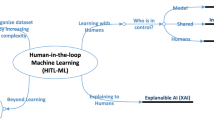Abstract
We present a decision support system for seamless and self-regulating learning. The decision support system presents a degree of novelty in supporting learners since it allows to: (1) understand the concepts that a learner may have acquired during her/his daily life activities, and (2) make the learner aware of these concepts and enforcing learning paths. Two key ideas are behind our results. The first idea relates to the identification of classes of indiscernible competences, and comes from the intuition that some real-world activities can lead to the acquisition of sets of competences (not always easy to discriminate) which can be considered as good approximations of competences related to a specific concept. Classes of indiscernible competences are building blocks that our decision support system uses to understand, with a certain degree of approximation, the concepts that a learner may have acquired, and this is an added value with regard to the self-awareness of a learner. The second idea is to allow our decision support system to identify incremental learning situations, which are situations in which a learning path is enforced or modified by the recognition that some concepts may have been learned, also during the execution of daily life activities. The decision support system grounds on three-way decisions and situation awareness. An evaluation of the system following the SAGAT approach has been done and reported in the paper.






Similar content being viewed by others
References
Azevedo R, Cromley JG (2004) Does training on self-regulated learning facilitate students’ learning with hypermedia? J Educ Psychol 96(3):523
Benincasa G, D’Aniello G, De Maio C, Loia V, Orciuoli F (2015) Towards perception-oriented situation awareness systems. In: Angelov P, Atanassov K, Doukovska L, Hadjiski M, Jotsov V, Kacprzyk J, Kasabov N, Sotirov S, Szmidt E, Zadrony S (eds) Intelligent systems’2014, advances in intelligent systems and computing. Springer International Publishing, New York
Biancalana C, Flamini A, Gasparetti F, Micarelli A, Millevolte S, Sansonetti G (2011) Enhancing traditional local search recommendations with context-awareness. In: Konstan JA, Conejo R, Marzo JL, Oliver N (eds) User Modeling, Adaption and Personalization: 19th International Conference, UMAP 2011, Girona, Spain, July 11-15, 2011. Proceedings, Springer Berlin Heidelberg, Berlin, Heidelberg, pp 335–340. doi:10.1007/978-3-642-22362-4_29
Chan TW, Chen FC, Chou CY (2006) Profile enhanced classroom learning. In: 2006 Fourth IEEE International Workshop on Wireless, Mobile and Ubiquitous Technology in Education (WMTE’06), IEEE, pp 3–6
D’Aniello G, Gaeta A, Orciuoli F, Rossi PG, Tomasiello S (2015a) Handling continuity in seamless learning via opportunistic recognition and evaluation of activity cohesion. In: Intelligent Networking and Collaborative Systems (INCOS), 2015 International Conference on, IEEE, pp 429–434
D’Aniello G, Gaeta M, Granito A, Loia V, Orciuoli F (2015b) Sustaining self-regulation processes in seamless learning scenarios by situation awareness. In: 2015 IEEE International Multi-Disciplinary Conference on Cognitive Methods in Situation Awareness and Decision Support (CogSIMA)
D’Aniello G, Gaeta M, Loia V, Orciuoli F, Sampson DG (2015c) Situation awareness enabling decision support in seamless learning. In: Intelligent Networking and Collaborative Systems (INCOS), 2015 international conference on, IEEE, pp 440–445
D’Aniello G, Loia V, Orciuoli F (2015) A multi-agent fuzzy consensus model in a situation awareness framework. Appl Soft Comput 30:430–440. doi:10.1016/j.asoc.2015.01.061
Endsley M, Jones D (2011) Designing for situation awareness: an approach to user-centered design. An approach to user-centered design, 2nd edn. Taylor and Francis, New York (Designing for situation awareness)
Endsley MR (2000) Direct measurement of situation awareness:validity and use of SAGAT. In: Endsley MR, Garland DJ (eds) Situation awareness analysis and measurement. Lawrence Erlbaum Associates, Mahwah
Endsley MR (1995) Toward a theory of situation awareness in dynamic systems. Human Factors J Human Factors Ergon Soci 37(33):32–64
Fole HJ, Matlin MW (eds) (1997) Sensation and perception. Allyn and Bacon, Newton
Gaeta A, Gaeta M, Orciuoli F, Ritrovato P (2012a) Managing semantic models for representing intangible enterprise assets: the aristotele project software architecture. pp 1024–1029. doi:10.1109/CISIS.2012.167
Gaeta A, Gaeta M, Piciocchi P, Vollero A, Ritrovato P (2012b) Exploiting semantic models and techniques to evaluate relevance of human resources in knowledge intensive organizations. pp 960–966. doi:10.1109/SITIS.2012.142
Gaeta A, Gaeta M, Piciocchi P, Ritrovato P, Vollero A (2014) Evaluation of the human resources relevance in organisations via knowledge technologies and semantic social network analysis. Int J Knowl Learn 9(3):219–241. doi:10.1504/IJKL.2014.068918
Gaeta M, Loia V, Orciuoli F, Ritrovato P (2015) S-wolf: semantic workplace learning framework. IEEE Trans Syst Man Cybern Syst 45(1):56–72. doi:10.1109/TSMC.2014.2334551
Hogan MP, Pace DE, Hapgood J, Boone DC (2006) Use of human patient simulation and the situation awareness global assessment technique in practical trauma skills assessment. J Trauma Acute Care Surg 61(5):1047–1052
Ma R, Kaber DB (2007) Situation awareness and driving performance in a simulated navigation task. Ergonomics 50(8):1351–1364
Matheus C, Kokar M, Baclawski K (2003) A core ontology for situation awareness. In: Information Fusion, 2003. In: Proceedings of the Sixth International Conference of, vol 1, pp 545–552. doi:10.1109/ICIF.2003.177494
Matheus CJ, Kokar MM, Baclawski K, Letkowski J, Call C, Hinman M, Salerno J, Boulware D (2005) SAWA: an assistant for higher-level fusion and situation awareness. In: Eighth international conference on information fusion
Miranda S, Orciuoli F, Sampson D (2016) A skos-based framework for subject ontologies to improve learning experiences. Comput Hum Behav 61:609–621. doi:10.1016/j.chb.2016.03.066
Nagulendra S, Vassileva J (2013) Minimizing social data overload through interest-based stream filtering in a P2P social network. In: International conference on social computing, SocialCom 2013, Washington, DC, USA, 8–14 September, 2013, pp 878–881
Yao Y (2011) The superiority of three-way decisions in probabilistic rough set models. Inf Sci 181(6):1080–1096
Ye J, Dobson S, McKeever S (2012) Situation identification techniques in pervasive computing: a review. Pervasive Mob Comput 8(1):36–66
Author information
Authors and Affiliations
Corresponding author
Rights and permissions
About this article
Cite this article
D’Aniello, G., Gaeta, A., Gaeta, M. et al. Self-regulated learning with approximate reasoning and situation awareness. J Ambient Intell Human Comput 9, 151–164 (2018). https://doi.org/10.1007/s12652-016-0423-y
Received:
Accepted:
Published:
Issue Date:
DOI: https://doi.org/10.1007/s12652-016-0423-y




